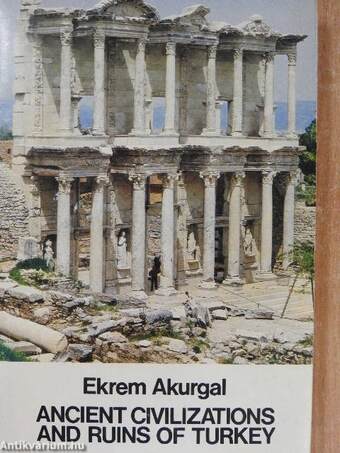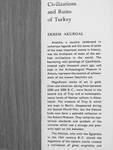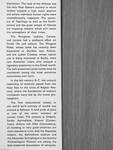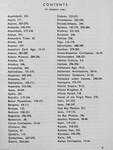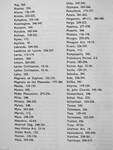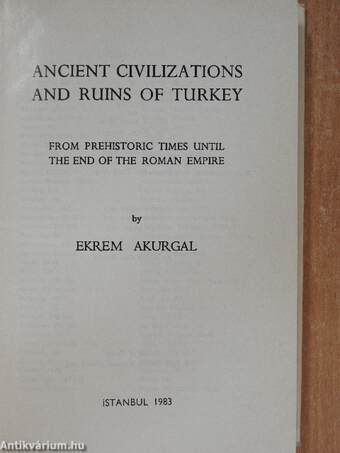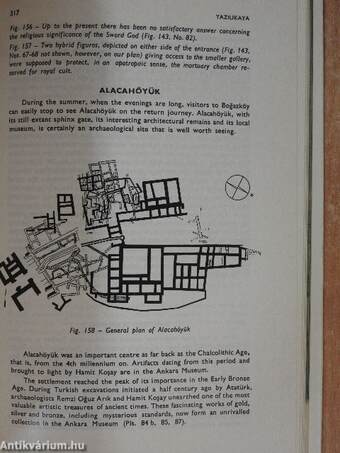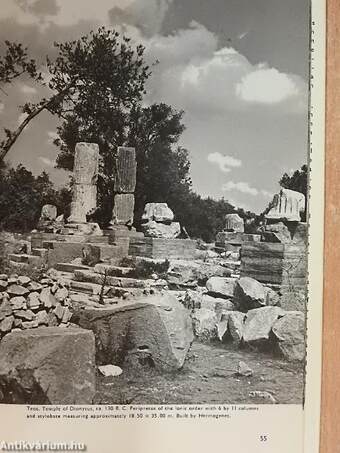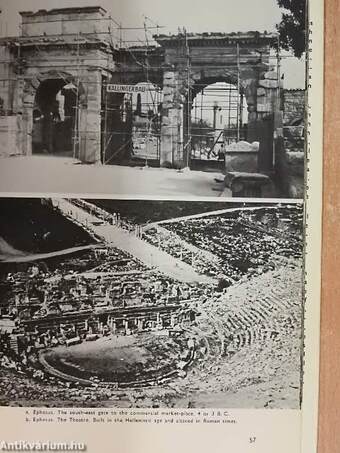1.062.395
kiadvánnyal nyújtjuk Magyarország legnagyobb antikvár könyv-kínálatát

VISSZA
A TETEJÉRE
JAVASLATOKÉszre-
vételek
Ancient Civilizations and Ruins of Turkey
From Prehistoric Times Until the End of the Roman Empire
| Kiadó: | Haset Kitabevi |
|---|---|
| Kiadás helye: | Isztambul |
| Kiadás éve: | |
| Kötés típusa: | Fűzött keménykötés |
| Oldalszám: | 520 oldal |
| Sorozatcím: | |
| Kötetszám: | |
| Nyelv: | Angol |
| Méret: | 20 cm x 14 cm |
| ISBN: | |
| Megjegyzés: | Színes és fekete-fehér fotókkal, illusztrációkkal. |
naponta értesítjük a beérkező friss
kiadványokról
naponta értesítjük a beérkező friss
kiadványokról
Fülszöveg
Civilizations and Ruins of Turkey EKREM AKURGAL Anatolia, a country celebrated in numerous legends and the scene of somé of the most important events in history, was the birthplace of somé of the earIiest civilizations in the world. The fascinating wall paintings of Catalhöyük, created eight thousand years ago, and kept in the Archaeological Museum in Ankara, represent the summit of achievement of any known Neolithic art. Magnificent works of art in gold, silver and electrum, dating from between 2500 and 2000 B.C., were found in the second city of Troy and at contemporaneous levels of Hattian culture in Alacahöyük. The treasure of Troy II, which was kept in Berlin, disappeared during the Second World War, but the Hattian finds now form a splendid collection in the Ankara Museum. They comprise mysterious standards and symbols of the universe which cast a strange and powerful spell on the beholder. The Hittites, who with the Egyptians in the 13th century B. C. shared the hegemony of... TovábbFülszöveg
Civilizations and Ruins of Turkey EKREM AKURGAL Anatolia, a country celebrated in numerous legends and the scene of somé of the most important events in history, was the birthplace of somé of the earIiest civilizations in the world. The fascinating wall paintings of Catalhöyük, created eight thousand years ago, and kept in the Archaeological Museum in Ankara, represent the summit of achievement of any known Neolithic art. Magnificent works of art in gold, silver and electrum, dating from between 2500 and 2000 B.C., were found in the second city of Troy and at contemporaneous levels of Hattian culture in Alacahöyük. The treasure of Troy II, which was kept in Berlin, disappeared during the Second World War, but the Hattian finds now form a splendid collection in the Ankara Museum. They comprise mysterious standards and symbols of the universe which cast a strange and powerful spell on the beholder. The Hittites, who with the Egyptians in the 13th century B. C. shared the hegemony of the eastern world, created a civilization of great originality anddistinction. The land of the Hlttites was the only Near Eastern country in which women enjoyed a high social position and where individual humán rights were unconditionally respected. The sanctuary of Yazilikaya as well as the fortifications and the great temple of Hattusa are imposing remains which still retain the atmosphere of their times. The Phrygians, Lydians, Carians, and Lycians had a profound effect on Greek life and culture. The Phrygian Midas, whose tomb has recently been discovered at Gordion near Ankara, and the Lydian Croesus, whose capital city is being excavated at Sardis, were two Anatolian rulers who enjoyed a legendary popularity in the Greek world. The well-preserved Lycian tombs must be considered among the most attractive monuments ever built. In the 6th century B. C. the cultural leadership of mankind passed from the Near East to the cities of Aegean Anatolia, where the foundations of western civilization were laid by the Ionian philosophers. The first monumental temple in the world built entirely of marble was erected at Ephesus. It held pride of place as one of the seven wonders of ancient times. The temples at Didyma, Sardis, Aphrodisias, Aizanoi (Lavdarhisar), Ankara and Ólba (Uzuncabur^), all standing in very good condition, are most impressive ruins. And the Aspendos theatre, the Aphrodisias stádium and the Alexander Sarcophagus in the Istanbul Archaeological Museum are among the best preserved monuments of antiquity. Vissza
Témakörök
- Idegennyelv > Idegennyelvű könyvek > Angol > Művészetek > Művészettörténet, általános
- Idegennyelv > Idegennyelvű könyvek > Angol > Művelődéstörténet
- Művelődéstörténet > Civilizációtörténet > Keleti
- Művelődéstörténet > Kultúra > Története
- Művelődéstörténet > Átfogó művek, tanulmányok
- Művészetek > Művészettörténet általános > Kontinensek művészete > Ázsia > Keleti
- Művészetek > Művészettörténet általános > Idegen nyelv > Angol
- Művészetek > Művészettörténet általános > Korszakok, stílusok > Ókor > Keleti
- Művészetek > Művészettörténet általános > Összefoglalók > Nemzetközi > Egyéb
Ekrem Akurgal
Ekrem Akurgal műveinek az Antikvarium.hu-n kapható vagy előjegyezhető listáját itt tekintheti meg: Ekrem Akurgal könyvek, művekMegvásárolható példányok
Nincs megvásárolható példány
A könyv összes megrendelhető példánya elfogyott. Ha kívánja, előjegyezheti a könyvet, és amint a könyv egy újabb példánya elérhető lesz, értesítjük.



